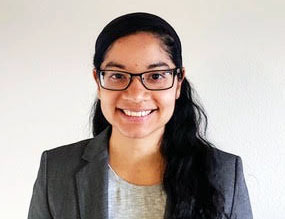Cinthia Cristal Magaña Moreno
 Name: Cinthia Cristal Magaña Moreno
Name: Cinthia Cristal Magaña Moreno
Department: Community Studies
What Award/ Scholarship did you receive? I received the Deans’ Undergraduate Award and Chancellor’s Undergraduate Award
What year do you expect to graduate? Spring 2020
Where do you call home? Fremont, California
With all of the choices for college, what made UC Santa Cruz stand out? UC Santa Cruz stood out to me because of their Community Studies Program’s curriculum. I knew the six-month field study of this major would allow me to see theories learned in class unfold in a healthcare organization of my choice. I also chose UC Santa Cruz because of its support services offered to transfer students. Namely, the Services for Transfer and Re-Entry Students (STARS), Cultivamos Excelencia Program, and Educational Opportunity Programs (EOP). Lastly, because I was awarded the UC Santa Cruz Karl S. Pister Scholarship.
What is your field of focus? Community Studies with a focus in Health Justice and a minor in Education
What do you hope to do once you graduate from UC Santa Cruz? Work for a government or nonprofit that focuses in Public Health, while doing EMT volunteer work.
What is one memorable moment that stands out for you as a student here? As a UC Santa Cruz student, I had the opportunity to explore and learn about topics outside of my major. During Spring Break I was able to travel to Maui, Hawaii and learn about the different types of sustainable food systems. I learned about the history of Hawaii’s indigenous people, culture, and ate their food. Through this trip, I experienced the different ecosystems as my group traveled throughout the island and worked at different farms. For the first time in my life I saw where my food actually comes from and held the origin of my favorite dessert in my hand: the cacao bean.
What is your one piece of advice for incoming students about life at UC Santa Cruz? I advise incoming students to get out of their comfort zones and immerse themselves in new learning experiences while making connections with people who will positively influence them to grow both professionally and personally.
How will this scholarship impact your academic life /research? This scholarship will help me financially to conclude my studies at UC Santa Cruz under these uncertain times.
Comments from Cinthia Magaña's faculty mentor:
Cinthia Cristal Magaña Moreno received both a Deans' Award and a Chancellor's Award for her research Adding New Lenses: Making Health Equity Work in Immigrant Communities Marked by Various Forms of Violence. Her faculty mentor wrote the following in support of her thesis: “Within a framework of health equity, Cinthia Magaña analyzes community-level health care in Oakland, California, where she spent six months with the pioneering center, La Clínica de la Raza. In analyzing this organization, Cinthia not only captured the centrality of locally determined, locally sensitive interventions to residents’ well-being; she also demonstrated that effective healthcare cannot and should not be disentangled from community members’ cultural identities and everyday social realities. Rather than imposing this framework, Cinthia discovered its validity during a very strong field study experience. The ‘lenses’ she refers to in her thesis comprise the answer to her research question: How are health and health equity understood in a clinic serving low income culturally diverse residents of a community marked by various forms of violence? How does La Clínica achieve its mission to provide ‘culturally appropriate, high quality, accessible health care for all,’ especially in a community plagued by structural, interpersonal, and everyday violence? To immerse herself in these questions, Cinthia became the Youth Program Coordinator for La Clínica’s community health education department’s “Youth in Action Violence Prevention Program.” She works from first principles; she has never been content to memorize or take cues from others as she delves into critical analysis. She’s not learning how to behave or perform like a student; she’s learning in order to understand, deeply. Her concept of ‘adding lenses’ – by which she means that the key to transforming health equity from a rhetorical goal into a reality, for this specific neighborhood, involved accurate cultural knowledge, sophisticated linguistic proficiency, and acceptance that these patients’ lives and histories were hard, and that without these interlocking understandings, clinicians would misdiagnose or fail to gain the trust and compliance of their patients – that was purely original. Her ‘first principles’ style of confronting the world, whether the world of ideas or the world of community action, gives Cinthia’s work a really refreshing power. She writes as a first-generation student for whom the term ‘health justice’ is anything but abstract.”
